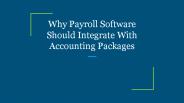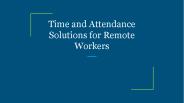Payroll Companies In Miami Beach PowerPoint PPT Presentations
All Time
Recommended
All employers need to run payroll – even smaller businesses – but that doesn’t mean that it’s an easy process, and that you might not have a whole bunch of questions about how it works and what you need to do as an employer.
| PowerPoint PPT presentation | free to download
Your Outsourced Payroll Provider Checklist
| PowerPoint PPT presentation | free to download
As arguably one of the trickiest administrative functions of any organization, the tiniest and seemingly inconsequential of mistakes can take the whole payroll process down, and even force employees to work overtime to make the necessary corrections. When payroll mistakes go completely unnoticed on the other hand, you can enter into the dangerous territory of non-compliance, and even incur fines and costly legal action.
| PowerPoint PPT presentation | free to download
Payroll is vital for the smooth running of any business, and is about so much more than calculating employee salaries – although that alone can be a daunting task depending on the size of your company. As such, many businesses seek help to make sure they get payroll right, and remain within the confines of the various tax and employee laws.
| PowerPoint PPT presentation | free to download
There are millions of companies throughout the U.S. outsourcing their payroll, but why do so many businesses choose to do this, and how does it benefit them? Read on to know more about the benefits of outsourcing payroll and learn how it could help your company:
| PowerPoint PPT presentation | free to download
It’s no secret that payroll compliance requirements can be complicated, and that managing payroll using an in-house team can be demanding at the best of times. Even for businesses with a smaller workforce, payroll must still be accurate, and always processed in a timely and efficient manner; get it wrong and your employees will soon let you know about it!
| PowerPoint PPT presentation | free to download
Human resources departments within most companies are responsible for much more than simply processing payroll or handling the open enrolment season every year. Whether a business is large or small, human resources can play a large and often essential role in developing company strategy and handling all aspects of the employee-centred activities of an organisation.
| PowerPoint PPT presentation | free to download
Mistakes made during the processing of payroll can be some of the costliest for a company, and when a business struggles to perform its own payroll duties due to lack of training, knowledge or experience, mistakes will almost certainly occur, some of which can result in a loss of finances, not to mention, credibility. One way straightforward and cost-effective solution to this is to outsource payroll to a professional company who will deal with everything efficiently and ensure that payroll is conducted within the confines of tax laws and other IRS requirements.
| PowerPoint PPT presentation | free to download
The continuity plans of businesses large and small have been consistently challenged over the past 6 months, and with no definite end to the pandemic in sight, they remain a challenge. With more employees choosing (or being instructed) to work from home, business and their workers have been forced to rethink many of their duties and responsibilities, payroll included.
| PowerPoint PPT presentation | free to download
As a business owner, how often do you review your bonus and overtime pay programs? While these may be expected expenses, they are often the source of payroll leakage that unless examined regularly, can lead to a loss in revenue and productivity.
| PowerPoint PPT presentation | free to download
More and more businesses are being forced to close temporarily, or have their employees work from home due to the current health crisis. There are fraudulent scams and phishing emails to watch out for, not to mention employee uncertainty and having to strictly adhere to the FLSA (Fair Labor Standards Act). The ‘Families First Coronavirus Response Act’ has also been introduced on March 18th, and all these things combined have created a lot of pressure on payroll departments all over the country.
| PowerPoint PPT presentation | free to download
Naturally, as an employer it’s your responsibility to ensure that your employees are paid accurately and in a timely manner, irrespective of how many workers you have. You must be aware of all laws pertaining to payroll and stay up to date with the myriad changes to these laws that can occur throughout the year. You also need to understand payroll taxes and be sure to file accurately and on time to avoid costly penalties. For most employers, payroll can be a minefield and the sensible solution would seem to be that of hiring a payroll professional to help you get it right.
| PowerPoint PPT presentation | free to download
Every business owner must start somewhere, and even if you have grown up around business owners or your family runs a business that you are involved in, going it alone can be a whole different kettle of fish. While it’s highly advisable that new business owners seek professional help and guidance when setting up their company and preparing to take on and pay a workforce, there are a few basics that it can be helpful to understand before you begin intake proceedings.
| PowerPoint PPT presentation | free to download
While it can be easy to look at outsourcing payroll duties as an extra expense you could do without, this is a rather simplistic way of viewing it, and does nothing to explore or explain the amount of money that a small business can save in the long term if payroll is outsourced. In fact, when you examine outsourcing in closer detail – in particular, payroll – many of the direct costs associated with processing payroll internally, can be massively reduced when working with an outside provider. Let’s look at this in closer detail:
| PowerPoint PPT presentation | free to download
Both time consuming and complex, payroll for employees is the bane of many a small business owners’ life, yet as a necessity, it has to be dealt with one way or the other. Fortunately, there are a number of ways in which you can simplify payroll, while still ensuring that your employees are paid; read on to know more:
| PowerPoint PPT presentation | free to download
With the impact of the global health pandemic being felt by thousands of industries the world over, many companies have faced operational and financial challenges, the likes of which they have never experienced before. Desperately searching for ways to deal with these challenges while continuing to meet the needs of their customers, clients and employees, has been tough for them, and decisions have had to be made with respect to cutting costs wherever possible.
| PowerPoint PPT presentation | free to download
Back at the beginning of November - as you’ll doubtless already know - the bill language was unveiled for the much discussed and long awaited, federal tax reform. One important provision highlighted in the bill, would lower the pass-through rate for business income to 25%, leaving the top individual tax rate at 39.6%,
| PowerPoint PPT presentation | free to download
In days of old, payroll involved a whole lot of manual calculations on ledgers and employees were all paid in cash. Gradually, as time progressed, pay checks were introduced and workers often waited up to a month to receive their pay. Then, when federal withholding taxes made their merry way into the equation, things got a whole lot more complicated.
| PowerPoint PPT presentation | free to download
While the process itself may seem easy – you’ve just hired your first employee and you need to pay them – if you’re new to business and payroll, you may find that it’s not clear exactly what you should be doing and how to go about it. There may be many words and phrases that you’re not familiar with, such as ‘pay periods’, ‘unemployment tax’ and ‘Form 941’ to name but a few.
| PowerPoint PPT presentation | free to download
The short answer to this question will always be a definitive, yes, but let’s look at the benefits of outsourcing payroll in a little more detail, and as a small business owner, you can make an informed decision as to whether you should choose to outsource this vital element of your company:
| PowerPoint PPT presentation | free to download
Keeping up to date on federal and state policy issues and laws with respect to Human Resources and payroll, is a constant, ongoing task for HR professionals, and many small businesses outsource this element of their operations to ensure that they’re always compliant.
| PowerPoint PPT presentation | free to download
As a business owner or manager, it can be tiresome to have to enter employee salary details into the payroll software, and then manually enter it into the accounting system, too. Without integration between the different software, this will always be a thankless and time-consuming task. In duplicating data from the payroll software to your general ledger, aside from it being a lengthy task, there is also ample room for error, and as all good business owners and managers should know, errors can cost a company more than just money.
| PowerPoint PPT presentation | free to download
Small businesses are said to employ almost half of all workers in the U.S. and if you run a business with employees, then your payroll is likely to be a little different this year; here are the top 10 changes to payroll for 2019:
| PowerPoint PPT presentation | free to download
Employees who arrive late, take longer than permitted for their lunch breaks or slip out of work early, can cost your business dearly, with up to 20 hours of productivity being lost in some cases. So, what can you and your business do to help prevent this and get back all those lost hours? The solution is to make your employees more accountable by implementing an effective time and attendance management system.
| PowerPoint PPT presentation | free to download
If you’re in the process of starting up your own business and are ready to take on employees, here are a few of the most basic payroll pointers to get you started. For more detailed information, you should seek advice from a professional company offering specialized payroll services.
| PowerPoint PPT presentation | free to download
People have been paid for the services they offer and the jobs they complete for as long as humans have been in existence, and the concept of recording and tracking payroll is by no means a modern one. The way in which this is done has naturally evolved as businesses have, and payroll is now largely computerised and high tech. The laws regarding payroll have also evolved over time, and now more than ever, it’s vital that you remain payroll compliant to avoid costly penalties and disgruntled employees.
| PowerPoint PPT presentation | free to download
Contrary to what some non-business minds may tell you, when put in place effectively, outsourcing payroll can be a fantastic way of cutting costs and giving a business an even better return on their investment. Read on to know more:
| PowerPoint PPT presentation | free to download
For all companies, saving money on their taxes forms an essential part of their overall business strategy, but for small businesses, what they can save in taxes, could be the difference between success and failure.
| PowerPoint PPT presentation | free to download
Time management in the workplace is imperative, and when it is not managed effectively, it can have disastrous effects on a company. From negative employee morale, labor law compliance and payroll processing efficiencies to employee productivity, poor time management is bad news for business and can hold back company growth and profits.
| PowerPoint PPT presentation | free to download
Changes are often being made to employment laws, and it can be hard for busy companies to keep up with them and ensure that they are always compliant. However, there are a few points to take into consideration when trying to do this, that will help you stay on the right side of the law and treat your employees fairly and responsibly:
| PowerPoint PPT presentation | free to download
Timekeeping and payroll are two elements of a business that are inherent to its success and making both as simple and effective as they can possibly be, is the first step towards a business being productive and profitable. Nowadays, more and more small businesses are turning to online systems to track and manage employee timekeeping and payroll, and there are multiple advantages, most of which can be found below:
| PowerPoint PPT presentation | free to download
Throughout the United States, outsourcing has been a hugely popular and effective way of managing work for many, many years, with companies quickly discovering its cost-effective advantages and productivity gains. When it comes to veterinary practices, however, outsourcing’s many opportunities for increased revenue and efficiency are frequently overlooked, and the practice of outsourcing continues to be a rarity. But if you’re running a busy veterinary practice and are struggling to maintain your accountancy commitments, outsourcing could help you relieve the burden considerably, just as it does in many other industries.
| PowerPoint PPT presentation | free to download
Starting a new business can be a stressful time and there will be a lot of different things to think about. One of these may centre around whether your company really needs Human Resources, and you may not even be fully aware of what HR can do for your business. Below we look at their role in more detail and see how they can help with such important things as employee benefits, payroll and even conflicts among colleagues or between staff and employer.
| PowerPoint PPT presentation | free to download
While it might seem obvious that a company should carry out background checks before they take on any new workers, you’d be surprised to learn how few do. One common reason cited for not doing so stems from the cost; using the services of a pre-employment background check company naturally increases the overall cost of hiring, but this is not a valid excuse. The benefits of carrying out official background checks have been proven to outweigh the initial expenditure, and companies who have done so go on to reap the rewards of having a trustworthy network of employees who have no hidden surprises up their sleeves. Not to mention the fact that if your company becomes known as one that doesn’t carry out such checks, your staff will quickly be comprised of those with poor criminal and employment records.
| PowerPoint PPT presentation | free to download
NATIONAL ASSOCIATION OF REALTORS Economic and. Commercial Real Estate ... Tampa and Orlando have replaced San Diego and Miami as top conversion markets ...
| PowerPoint PPT presentation | free to view
A form of insurance that pays workers should they injure themselves at work or become disabled as a result of their job, workers compensation plans offer coverage of medical fees related to those injuries, and when an employee accepts the insurance coverage, they waive their right to sue their employer.
| PowerPoint PPT presentation | free to download
Employee retirement plans are still proving a popular incentive for many employees. For employers, there are a number of advantages to be had from offering a 401(k) employer match as part of an employee retirement plan, and three of the most important are listed below:
| PowerPoint PPT presentation | free to download
Never heard of an LMS before? Don’t know the importance of investing in the continuous learning and development of your employees?
| PowerPoint PPT presentation | free to download
Offering a wide range of benefits to all manner of businesses, remote working isn’t just good for employees, but it does give managers a good deal of challenges, especially when it comes to time and attendance.
| PowerPoint PPT presentation | free to download
HR management plays a vital role in the upkeep of any business, not least because it helps to guarantee employment law and statutory compliance. Such legal issues can cause very real problems for businesses of all sizes if not addressed professionally, and here are some of the most important compliance issues in human resources management:
| PowerPoint PPT presentation | free to download
HR management plays a vital role in the upkeep of any business, not least because it helps to guarantee employment law and statutory compliance. Such legal issues can cause very real problems for businesses of all sizes if not addressed professionally, and here are some of the most important compliance issues in human resources management:
| PowerPoint PPT presentation | free to download
Human Resources should never be overlooked, no matter what type of business you’re running or what industry you’re involved in, and even small to medium sized businesses should have a HR department, or outsourced HR assistance. The latter is an affordable option that suits many smaller businesses, as it avoids hiring inhouse employees and the costs associated with them.
| PowerPoint PPT presentation | free to download
For many small business owners, spending money on areas of their business that give no clear return on investment, such as Human Resources, proves tricky to justify, despite the fact that this function is a vital aspect of any successful business with employees. This may come down to the fact that HR is, in many cases, often misunderstood, and some of its primary functions are not accurately represented and accounted for.
| PowerPoint PPT presentation | free to download
A well-run HR department can be of inherent value to any business, large or small, and once you begin to appreciate this fact and invest in HR, you’ll find that your employees become more empowered and more productive. Great health insurance is more than a gift to employees, it’s a reason for them to stay loyal to the company, to work harder and to feel more valued as a worker; in turn, as an employer, you get to reap all the rewards of an invigorated workforce.
| PowerPoint PPT presentation | free to download
As a tumultuous and challenging 2020 is now firmly behind us, it’s time to look forward to the year ahead and the 4 biggest new trends in HR that are set to change the way we work over the coming months:
| PowerPoint PPT presentation | free to download
With unemployment figures having hit an all-time high, and average incomes falling dramatically, it’s no surprise that there have been some recent changes to retirement planning in the workplace.
| PowerPoint PPT presentation | free to download
There are few aspects of HR workflows that haven’t been impacted by the ongoing health pandemic, COVID-19, and pre-employment background checks are no exception. Courts and other facilities for accessing public records have been closed, and laboratories for drug-testing have been too, or at the very least, been very hard to get access to.
| PowerPoint PPT presentation | free to download
Whatever type of organization you run, and whatever type of product or service you produce, time and attendance has a hugely significant role to play, and here’s why:
| PowerPoint PPT presentation | free to download
Having workers compensation coverage is required by law in the majority of states throughout the US, but aside from that, having it helps to get injured employees back to work as quickly, and safely as possible; a win-win for both parties. This is why the development of an effective workers compensation program is vital for any company, no matter its size. To achieve this though, it’s important to be aware of the latest trends in this form of insurance, and with the global pandemic hitting many countries hard, after-effects of this are anticipated to have an impact on the insurance industry as a whole, well into 2021.
| PowerPoint PPT presentation | free to download
A significant step for any small business owner, are you clear on whether you should offer your employees a 401(k) plan, or do you need a little extra help with the decision?
| PowerPoint PPT presentation | free to download
If you’re new to the world of business, or have recently begun taking on employees, you may have some questions surrounding workers compensation insurance, here are a few of them along with their answers:
| PowerPoint PPT presentation | free to download
It’s absolutely possible to keep health insurance costs to a minimum for you, as the owner of a business, and your employees, while still ensuring that everyone gets the coverage they deserve. Here are 6 money saving health insurance tips for small businesses:
| PowerPoint PPT presentation | free to download
Injury triage can significantly reduce the costs associated with workers compensation, when dome correctly, and can also get injured employees back to work again while increasing overall workplace satisfaction for all employees. If you haven’t already implemented injury triage in your workers compensation program, now could be the time to do so:
| PowerPoint PPT presentation | free to download
In the light of financial hardships many employees and businesses are suffering from due to the current heath crisis, employers might want to spend some time reviewing their qualified retirement plans and consulting with advisors to see if there any available provisions they can take advantage of.
| PowerPoint PPT presentation | free to download
With so many aspects of business changing due to the ongoing health crisis, employees and their employers are facing a multitude of financial hardships that will undoubtedly have a significant impact upon such benefits as qualified retirement plans.
| PowerPoint PPT presentation | free to download
The Qualified Small Employer Health Reimbursement Arrangement or QSEHRA, is a new and increasingly popular health insurance option created back in December of 2016. In much the same way as HRA’s, the QSEHRA enables business with fewer than 50 employees to offer their workers a monthly allowance of tax-free money. The employees then opt and pay for health care – which can include personal insurance policies – and the employer reimburses them up to their allowance amount. In this way, businesses can better control their budget, while still giving their workers a meaningful benefit.
| PowerPoint PPT presentation | free to download
























































